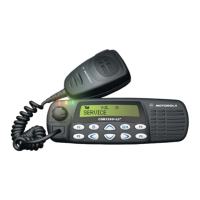Theory of Operation
2.3.4 Transmit Signalling Circuits
Refer to Figure 2-4 for the descriptions that follow.
l
su~~ER~
+
44
19
HIGH SPEED
I 5-a-2 S
l:A
T E I
l
__r
I CLOCK IN
ENCODER r
SPLAnE
,
(HSIO)
FILTER
MICRO
1!2
I
OTMF
~
CONTROLLER
SPI
ENCODER
BU
S
U0101
55
ASFIC
_
CMP
U0221
la;;l
16 LO
WSPEEb
PL
Ls
J
CLOCK
IN
ENCODER SUMMER
(LSIO)
+
I ATTENUATOR
Figure 2-4. Transmit Signalling Paths
The three types of transmit signalling paths are as follows:
40
MOD
IN
(S
TO
RF
SECTION
YNTHESIZER)
Sub-audible data (PL/DPL/connect tone) summed with transmit voice or signalling
DTMF data for telephone communication between trunked and conventional systems
Audible signalling
Note: All three types are supported by the hardware while the radio software determines which
signalling type is available.
2.3.4.1 Sub-Audible Data (PLIDPL)
2-11
Sub-audible data implies signalling whose frequency/data rate
is
below 300Hz. PL and DPL
waveforms are used for conventional operation and connect tones for trunked voice channel
operation. The trunking connect tone is simply a
PL
tone at a higher deviation level than
PL
in
a
conventional system. Although it
is
referred to as "sub-audible data," the actual frequency spectrum
of
these waveforms may be as high as 250 Hz, which is audible to the human ear. However, the
radio receiver filters out any audio below 300Hz, so these tones are never heard
in
the actual
system.
Only one type
of
sub-audible data can be generated by U0221 (ASFIC CMP) at any one time. The
process is as follows, using the
SPI
BUS, the
IJP
programs the ASFIC CMP to set up the proper low-
speed data deviation and select the
PL
or DPL filters. The
IJP
then generates a square wave which
strobes the ASFIC PL I DPL encode input LSIO U0221-18 at twelve times the desired data rate. For
example, for a
PL
frequency
of
103Hz, the frequency of the square wave
is
1236Hz.
This drives a tone generator inside U0221 which generates a staircase approximation to a
PL
sine
wave
or
DPL data pattern. This internal waveform
is
then low-pass filtered and summed with voice
or data. The resulting summed waveform then appears on U0221-40 (MOD IN), where it is sent to
the RF board as previously described for transmit audio. A trunking connect tone would be
generated
in
the same manner as a
PL
tone.

